This data was originally featured in the July 20, 2022 newsletter found here: https://www.trustinsights.ai/blog/2022/07/inbox-insights-july-20-2022-behind-buzzwords-bing-vs-google-measurement-strategy/
In this week’s Data Diaries, we review two big players in the search engine arena: Bing vs. Google . Let’s do a deep dive on the results from two different search engines, but not in the normal way. Both Google Search Console and Bing Webmaster Tools allow you to bulk export your data and analyze it, so let’s do an apples-to-apples comparison of these two services.
The two reports we’ll compare are queries and pages – which pages on our site earn the most traffic from each service, and which search terms earn the most traffic from each service? If you’d like to see the behind-the-scenes data processing for this, we turned it into a music video here.
Let’s start with our data summaries. How many terms are we talking about as a whole, and which terms are unique? In our dataset, we have 16,941 total terms; of those, 2,025 are unique to Bing and 14,738 are unique to Google. 178 terms are shared among both.
For terms unique to Bing, what’s the opportunity cost if we totally ignore Bing? What would that lose us?
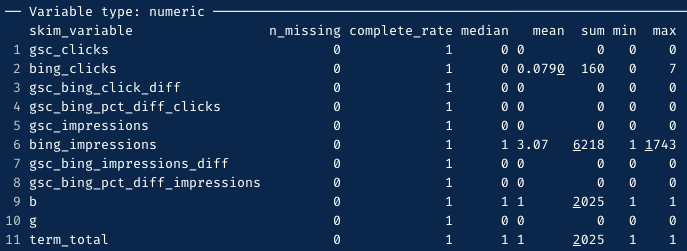
It’s 6,218 impressions and 160 clicks unique to Bing.
For terms unique to Google, what does that opportunity cost look like if we were to totally ignore Google?
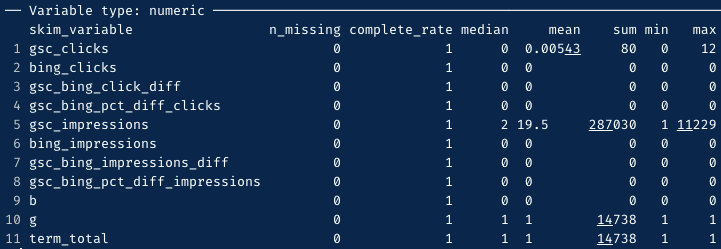
That’s 287,030 impressions and 80 clicks unique to Google.
Isn’t that interesting? Even though focusing exclusively on Google would earn many more impressions, focusing on Bing would earn more actual clicks, actual traffic when we look at traffic exclusive to each platform.
Let’s dig into some of those terms. What do the terms that send us the most traffic from Bing look like?
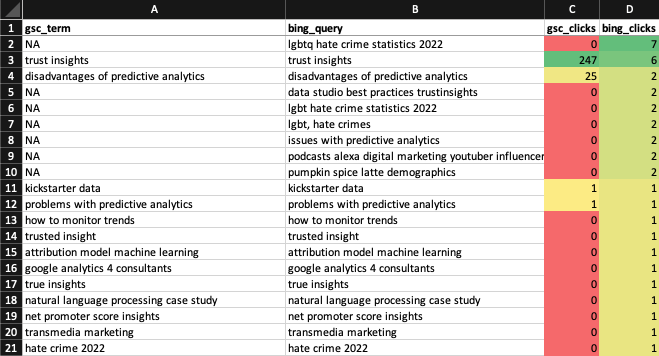
Note the large number of NAs in the Google column; that indicates a search term is unique to Bing when it comes to the Trust Insights website.
Next, let’s look at the inverse, Google top terms:
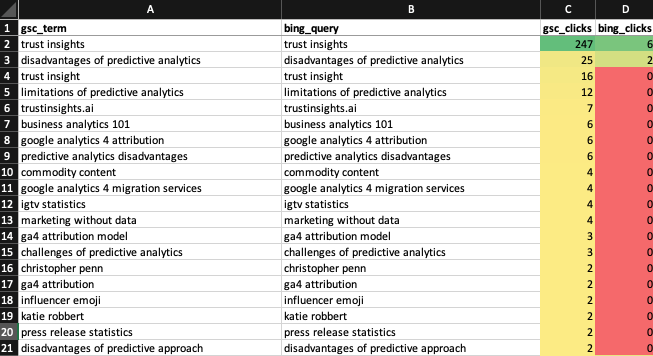
We see our brand name as the biggest driver by far of traffic from Google, which is terrific. We also see that Bing at least knows about the other terms Google sends us traffic for, though Bing does not send traffic for those terms.
Let’s turn our attention to pages on our website. Out of 1,006 pages detected by both search engines, we have 174 pages detected only by Bing and 346 detected only by Google. 486 pages were detected by both search engines.
For pages unique to Bing, what kind of exclusive impact does Bing have that Google doesn’t deliver?
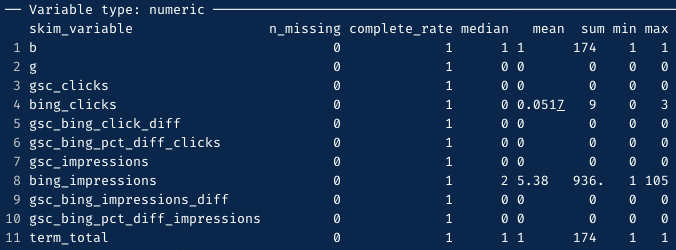
Bing adds 936 impressions and 9 clicks that Google does not. What about Google? What kind of exclusive impact does it deliver that Bing does not?
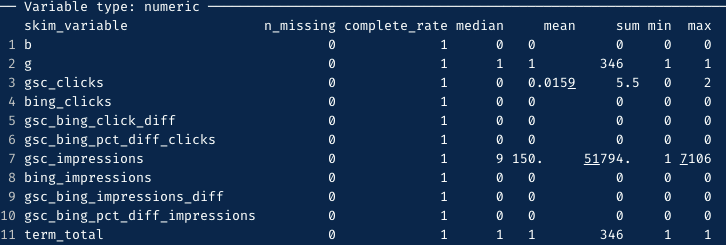
Google delivers 51,794 impressions and 5.5 clicks that Bing does not.
What do we make of all this data? What we see is that on an impression to click basis, even though Bing creates fewer search impressions for our site, it sends far more traffic per search than Google does. This syncs up with the point that many SEO folks like Rand Fishkin have made, that Google’s zero-click search results may be eating away at the traffic Google sends to our sites.
What should we do with this information? For us, it means making sure we invest just as much time in checking out and optimizing our site for Bing as it does Google. For you, it means going into Bing Webmaster Tools and seeing how your numbers compare with Google, then seeing if it makes sense to have an SEO strategy that focuses on one platform more than another.
What would that look like? Investigations by publications like Search Engine Journal have said that while both search engines look at things like content quality and inbound links, there are differences in how the two approach ranking signals. For example, Google has disclaimed that social media plays a role as a ranking factor; Bing has overtly said they take social posts into account.
Fortunately, we don’t need to choose one platform over the other exclusively. We can adopt a strategy that serves both platforms’ perspectives, and accrue as much traffic as we can from both. What we would change is perhaps some increased focus on Bing’s ranking factors and more frequent reporting/checkins with Bing Webmaster Tools.
|
Need help with your marketing AI and analytics? |
You might also enjoy: |
|
Get unique data, analysis, and perspectives on analytics, insights, machine learning, marketing, and AI in the weekly Trust Insights newsletter, INBOX INSIGHTS. Subscribe now for free; new issues every Wednesday! |
Want to learn more about data, analytics, and insights? Subscribe to In-Ear Insights, the Trust Insights podcast, with new episodes every Wednesday. |






